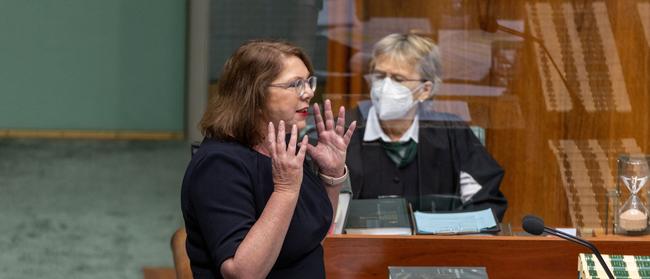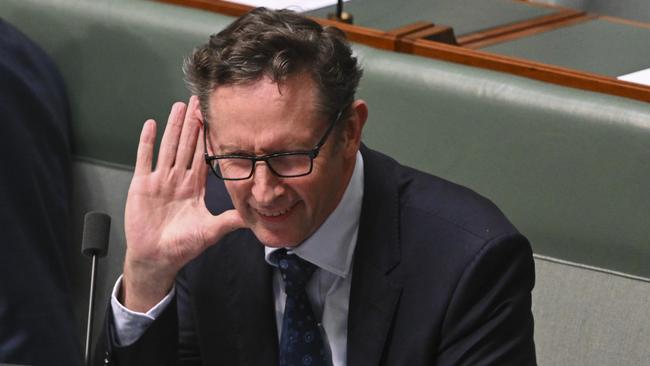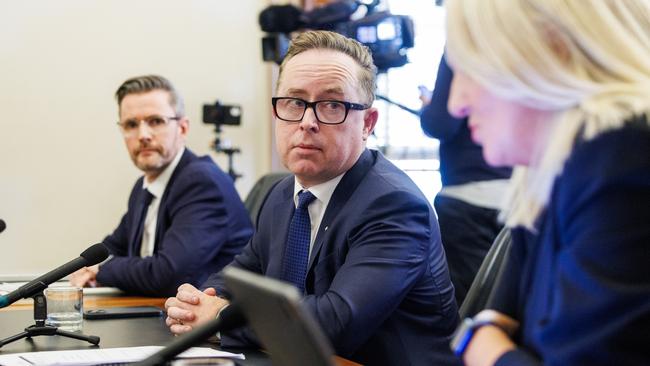Transport Minister Catherine King refuses to back Labor MP’s claim Qantas profitability reason behind blocking Qatar
Transport Minister Catherine King has tried to back away from a junior minister’s explanation that Qatar Airways application for extra flights was to keep Qantas profitable.
Transport Minister Catherine King has backed the government away from a junior minister’s assertion she blocked Qatar Airways’ application for an extra 28 flights a week done to protect Qantas’ profitability.
Assistant Treasurer Stephen Jones told The Australian Financial Review on Monday that while the government could “drive prices down” by extending Qatar Airways’ air rights, it risked making it “unsustainable for the existing Australian-based carrier.”
Ms King last month rejected Qatar’s application for an extra 28 flights a week, saying they were “not in the national interest” but would not explain further.
On Monday, she was forced to address Mr Jones’ statement.
“I wouldn’t have used the same words that Stephen did,” Ms King said.
“There’s no one factor that swayed my consideration one way or the other.”

Qatar Airways had applied for permission to launch 28 new flights per week. Just last week, Qantas announced a record underlying profit of $2.47bn.
Separately at a business lunch in Perth on Monday, Treasurer Jim Chalmers referred to the decision to block Qatar Airways’ application as one made independently by the Transport Minister.
“It was Catherine’s decision,” the Treasurer said.
Qantas had previously lobbied the federal government to block Qatar Airways’ application.
The decision to block has proven to be extraordinarily controversial with the government facing criticism for stifling competition in the aviation sector, while at the same time, launching a two-year review to improve the country’s competition policy.

Virgin Australia said international airfares were being kept high by a lack of capacity, and raised concerns with Mr Jones’ statement.
“Any suggestion that denying Qatar additional flights was designed to protect Qantas’ medium-to-long term sustainability neglects the fact that blocking Qatar damages the domestic and international competitive position of Virgin Australia in favour of Qantas,” chief corporate affairs & sustainability officer, Christian Bennett said.
“Virgin Australia … is the main source of competition to the Qantas Group, and that task is challenging enough without Qantas having public policy designed for its benefit.”
Condemnation from Australia’s travel industry – which argues that the decision to deny Qatar Airways' application will cost the tourism industry up to $788m a year – has also added to the government’s woes.
In response to written questions, Ms King skirted Mr Jones’ statement, saying a “range of factors” were considered when determining whether an expansion of air rights was within Australia’s “national interest”.
“The government has decided not to approve the Qatar Civil Aviation Authority request for additional services at this time,” Ms King said.
Outgoing Qantas chief executive Alan Joyce on Monday at a Senate inquiry said the government’s decision was in the national interest.
“Various countries around the world protect their national interest and I think what the assistant treasurer was referring to is that Australia should protect its own national interest,” Mr Joyce said.

“That is making sure we get reciprocal or other arrangements when you grant traffic rights [to international carriers].
“I don’t think anyone would say you should grant traffic rights that are disadvantageous to the national interest.
“That’s what the assistant treasurer was saying in our mind, and we would agree with that.”
The Qantas boss also pointed to the recent bilateral air rights rejection in Fiji to claim that air rights rejections were relatively commonplace.
“Qatar can add capacity through flying bigger aircraft to cities like Adelaide, Darwin. There is nothing stopping them from adding capacity to those locations,” Mr Joyce added.



To join the conversation, please log in. Don't have an account? Register
Join the conversation, you are commenting as Logout